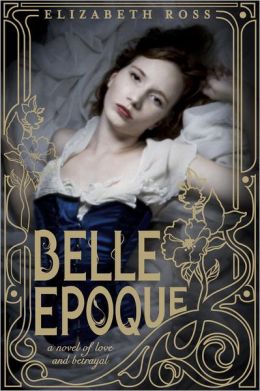Belle Epoque, by Elizabeth Ross
Jun 24
2013

It feels weird to commend someone for an idea that they took from someone else, but that's what I'm doing here: Elizabeth Ross has openly acknowledged that the inspiration for her novel Belle Epoque was taken from an Emile Zola short story, but I give her full props for borrowing with style.
Sixteen-year-old runaway Maude Pichon is poor, plain, and friendless. Alone in late 1880s Paris, poverty forces her to accept a position as a “repoussoir”—a homely young woman paid to accompany wealthy, attractive girls around the Paris social scene and make them look even prettier in comparison. Maude lands a job immediately: a countess hires her as a repoussoir for her daughter. The work, while humiliating, is well paid, but Maude is torn between the financial security of her new position and her growing friendship with the countess's daughter, who knows nothing about Maude's job and deserves better than her mother's schemes for a socially advantageous marriage.
Ross takes the seed of Zola's short story—the fictional job of a repoussoir—and expands it into an entertaining, teen-friendly novel. Belle Epoque explores ideas about the power of beauty and charm, and the author takes full advantage of her historical setting (Paris in 1888-89, twenty years after the setting of Zola's story). She also includes a minor but thematically rich subplot about the construction of the Eiffel Tower, a building that many Parisians of the time described as hideous.
Sadly, Belle Epoque makes a critical misstep: much of the climax centers around Maude's increasing imitation of the behavior of her wealthy, amoral clients, and her (unrequited) crush on a handsome aristocrat. The “girl gets a makeover to fit in with unpleasant rich kids/girl starts acting like an unpleasant rich kid herself/girl receives her comeuppance” plot might be a teen-entertainment staple, but Maude would have to be stupid or delusional to assume that any of the shallow young noblemen she meets would be seriously interested in her. The idea simply doesn't work in a historical context, and, as most of the charm of Belle Epoque comes from its historical context, including it drags down the quality of the entire book.
Review based on a publisher-provided copy.
Sixteen-year-old runaway Maude Pichon is poor, plain, and friendless. Alone in late 1880s Paris, poverty forces her to accept a position as a “repoussoir”—a homely young woman paid to accompany wealthy, attractive girls around the Paris social scene and make them look even prettier in comparison. Maude lands a job immediately: a countess hires her as a repoussoir for her daughter. The work, while humiliating, is well paid, but Maude is torn between the financial security of her new position and her growing friendship with the countess's daughter, who knows nothing about Maude's job and deserves better than her mother's schemes for a socially advantageous marriage.
Ross takes the seed of Zola's short story—the fictional job of a repoussoir—and expands it into an entertaining, teen-friendly novel. Belle Epoque explores ideas about the power of beauty and charm, and the author takes full advantage of her historical setting (Paris in 1888-89, twenty years after the setting of Zola's story). She also includes a minor but thematically rich subplot about the construction of the Eiffel Tower, a building that many Parisians of the time described as hideous.
Sadly, Belle Epoque makes a critical misstep: much of the climax centers around Maude's increasing imitation of the behavior of her wealthy, amoral clients, and her (unrequited) crush on a handsome aristocrat. The “girl gets a makeover to fit in with unpleasant rich kids/girl starts acting like an unpleasant rich kid herself/girl receives her comeuppance” plot might be a teen-entertainment staple, but Maude would have to be stupid or delusional to assume that any of the shallow young noblemen she meets would be seriously interested in her. The idea simply doesn't work in a historical context, and, as most of the charm of Belle Epoque comes from its historical context, including it drags down the quality of the entire book.
Review based on a publisher-provided copy.
Posted by: Julianka
No new comments are allowed on this post.
Comments
No comments yet. Be the first!